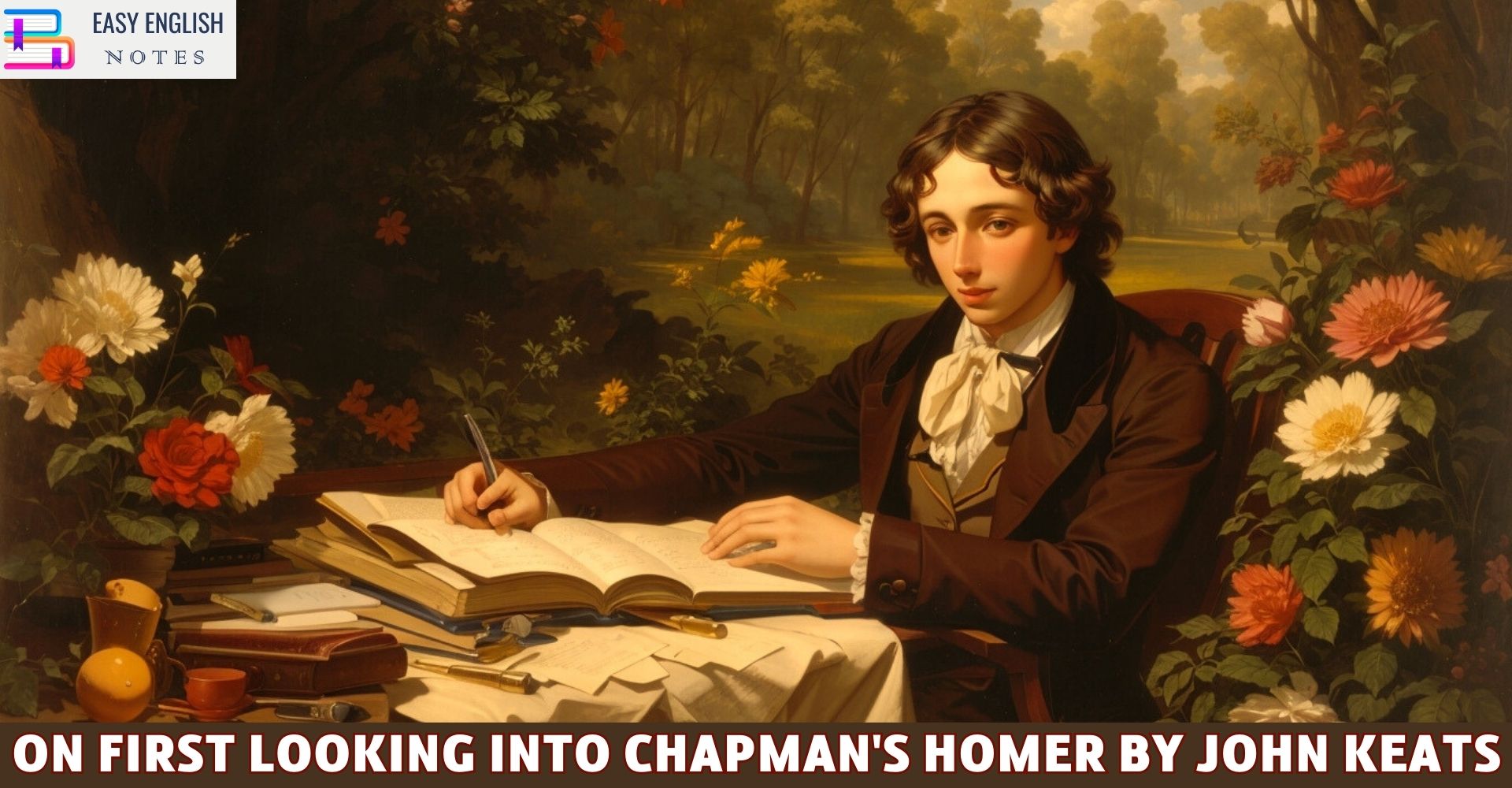John Keats’ poem, “On First Looking into Chapman’s Homer,” vividly captures the awe and exhilaration that the poet experiences upon discovering the literary brilliance of George Chapman’s translations of Homer’s epics. The poem is a lyrical testament to the transformative power of art and the profound impact it can have on the human spirit.
The poem begins with the speaker recounting his exploration of the vast realms of literature, comparing it to the adventurous voyages of early explorers like Cortez and Balboa. Just as they discovered new lands and horizons, the speaker has discovered the captivating world of Chapman’s translations of Homer’s works. The metaphor of discovery is used to emphasize the novelty and excitement of this literary revelation.
Keats then employs celestial imagery, referring to “realms of gold” that have been reached. This image reinforces the idea that the poet has stumbled upon something precious and invaluable. The mention of Cortez and his men gazing upon the Pacific Ocean for the first time draws a parallel to the speaker’s own experience of revelation upon reading Chapman’s Homer.
The poem continues as the speaker describes the emotions he felt while reading Chapman’s translation of “Homer’s lofty song.” The phrase “much have I traveled in the realms of gold” underscores the depth of the speaker’s engagement with the text, suggesting that through Chapman’s words, he has traveled through time and space to ancient Greece.
The speaker’s discovery of Homer’s greatness is likened to that of an astronomer who makes a groundbreaking discovery in the sky. The metaphor of the “stout Cortez” is now extended to include the astronomer’s experience, emphasizing the awe-inspiring nature of both literary and scientific exploration.
The poem concludes with the speaker expressing his gratitude for the enrichment of his understanding and his sense of wonder. He acknowledges that Chapman’s Homer has added a new dimension to his intellectual and artistic experiences, broadening his horizons and enriching his inner world. The poem ends with a couplet that celebrates the twin pleasures of artistic and intellectual exploration, highlighting the enduring impact of this newfound revelation.
Keats’ poem takes us further into the depths of his emotions and the impact of his discovery. The speaker’s awe and reverence for Chapman’s translations of Homer’s epics are palpable, as he uses language rich with imagery and emotion to convey the depth of his experience.
The speaker’s metaphor of comparing his discovery to that of early explorers reflects the sense of adventure and wonder that accompanies intellectual exploration. Just as these explorers opened up new lands and possibilities, the speaker’s encounter with Chapman’s Homer has opened up new realms of understanding and appreciation in the world of literature.
Also Read :
- Compare Hamlet with Macbeth, Othello and other Tragedies
- “The Pardoner’s Tale” is the finest tale of Chaucer
- Prologue to Canterbury Tales – (Short Ques & Ans)
- Confessional Poetry – Definition & meaning
The phrase “conquer’d” by the “magic hand” of Chapman emphasizes the transformative effect that the translations have had on the speaker. The choice of the word “magic” suggests that the power of art and literature can be enchanting and almost supernatural in its ability to transport and captivate.
Keats’ reference to the “Darien” serves as a historical allusion to the ill-fated attempts by the Scots to establish a colony in Panama. The speaker’s use of this metaphor suggests that, just as the Scots faced challenges and hardships in their exploration, the speaker himself has faced intellectual challenges and uncertainties on his journey of discovery.
The astronomer metaphor continues to evolve, as the speaker describes the “new planet” that has been added to the astronomer’s universe. This expansion of the metaphor underscores the idea that new discoveries in art and literature can expand one’s intellectual and emotional horizons in a similar way that astronomers’ discoveries expand their understanding of the universe.
The closing couplet of the poem provides a satisfying resolution to the speaker’s journey of discovery. The reference to “first is it” echoes the initial metaphor of exploration, as the speaker reflects on the first time he gazed upon Chapman’s Homer. The repetition of “wide” and “world” emphasizes the breadth of the speaker’s experiences and understanding, while also suggesting that the world of literature is boundless and ever-expanding.
In conclusion, “On First Looking into Chapman’s Homer” is a deeply personal and eloquent expression of the transformative power of literature. Through metaphors drawn from exploration and astronomy, Keats captures the profound impact of the speaker’s discovery of Chapman’s translations of Homer’s epics. The poem resonates with anyone who has experienced the exhilaration of encountering great art and literature, reminding us that such discoveries can broaden our horizons, enrich our lives, and leave an indelible mark on our souls.
PLEASE HELP ME TO REACH 1000 SUBSCRIBER ON MY COOKING YT CHANNEL (CLICK HERE)











